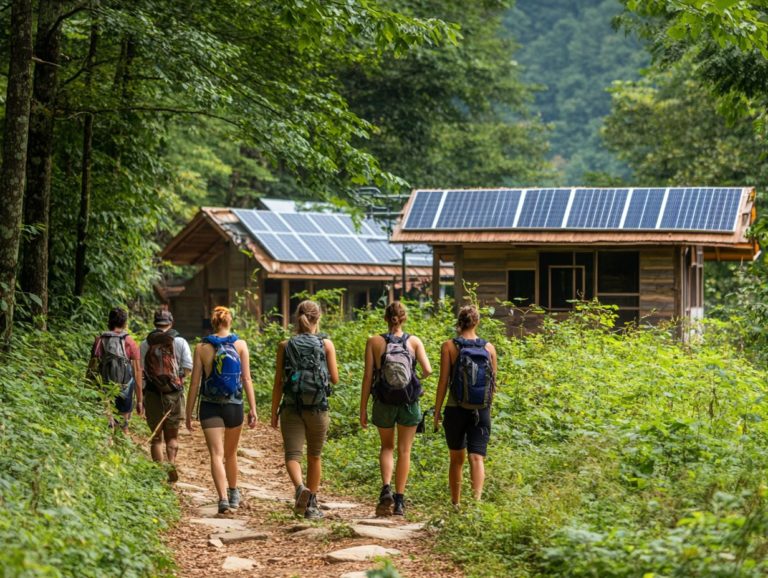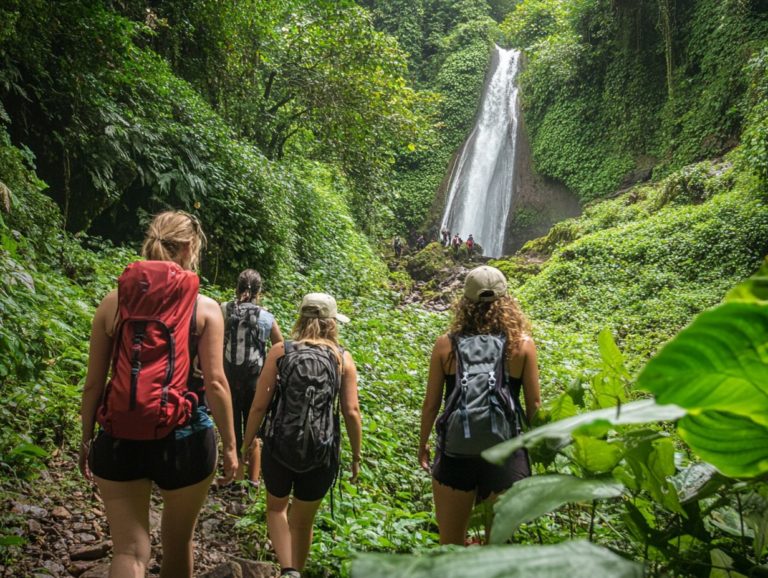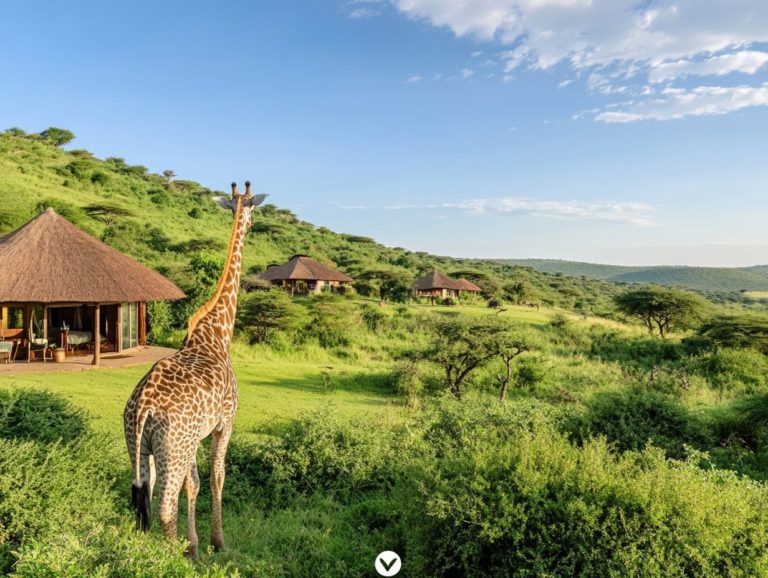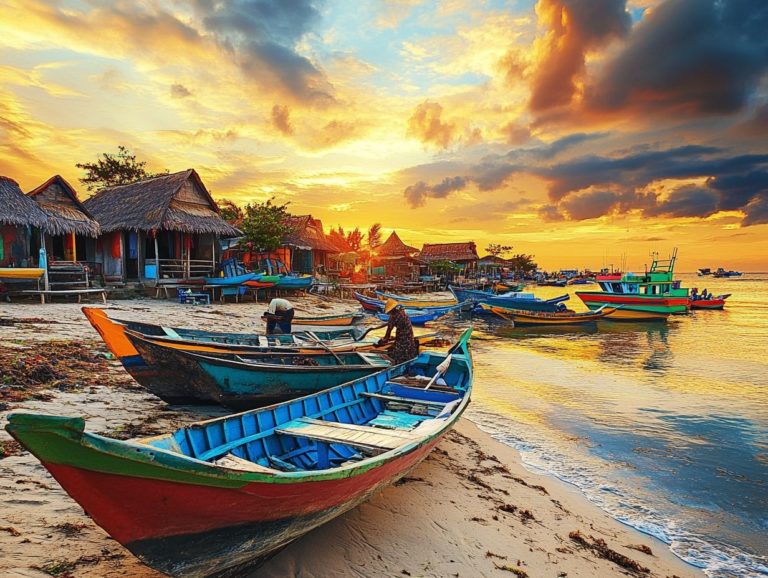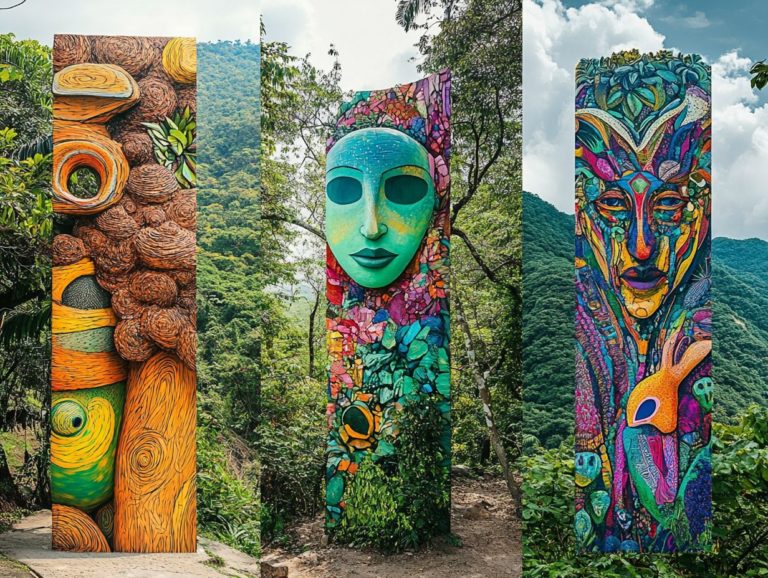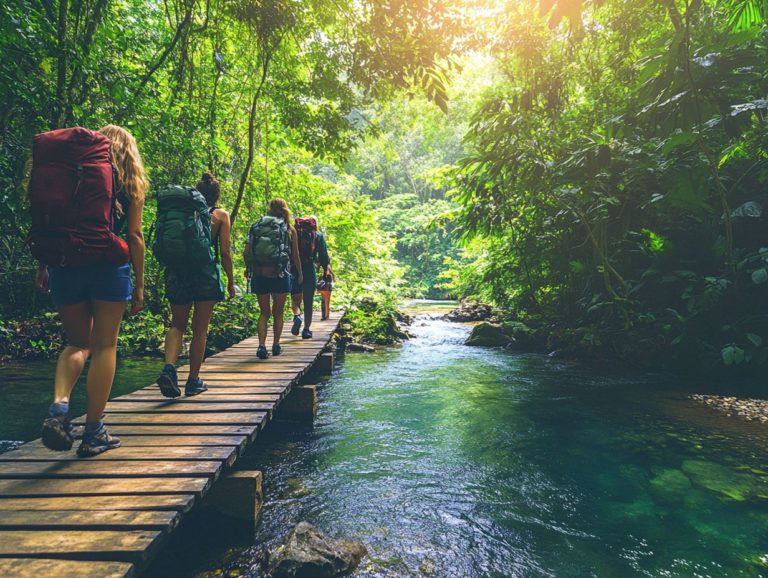Top Sustainable Safari Destinations in Africa
Embarking on a safari is not just an adventure; it’s a great chance to immerse yourself in nature while helping to preserve Africa’s breathtaking landscapes and wildlife.
This article explores the best sustainable safari destinations in Africa. From the iconic Maasai Mara in Kenya to the diverse ecosystems of Botswana’s Okavango Delta, adventure awaits.
You’ll discover the myriad benefits of opting for a sustainable safari, how your choices can contribute to vital conservation efforts, and the challenges faced within this essential sector.
Join us as we explore the optimal times to visit and the extraordinary experiences that await you in these remarkable natural wonders.
Contents
- Key Takeaways:
- 1. Maasai Mara National Reserve, Kenya
- 2. Serengeti National Park, Tanzania
- 3. Okavango Delta, Botswana
- 4. Kruger National Park, South Africa
- 5. Hwange National Park, Zimbabwe
- 6. Etosha National Park, Namibia
- 7. South Luangwa National Park, Zambia
- 8. Bwindi Impenetrable National Park, Uganda
- 9. Volcanoes National Park, Rwanda
- 10. Chobe National Park, Botswana
- 11. Masai Mara National Reserve, Kenya
- 12. Ngorongoro Conservation Area, Tanzania
- 13. Amboseli National Park, Kenya
- 14. Queen Elizabeth National Park, Uganda
- 15. Kidepo Valley National Park, Uganda
- What Are the Benefits of Choosing a Sustainable Safari?
- How Can Tourists Support Sustainability Efforts in These Destinations?
- What Are the Challenges Facing Sustainable Safaris in Africa?
- How Can Sustainable Safaris Contribute to Conservation Efforts?
- What Are the Best Times to Visit These Sustainable Safari Destinations?
- Frequently Asked Questions
- What are Africa’s best sustainable safari spots?
- Why are these destinations considered sustainable?
- What is the benefit of visiting a sustainable safari destination?
- How can I ensure I am choosing a sustainable safari tour?
- What types of activities can I expect to participate in at a sustainable safari destination?
- Is it possible to have a luxury experience at a sustainable safari destination?
Key Takeaways:
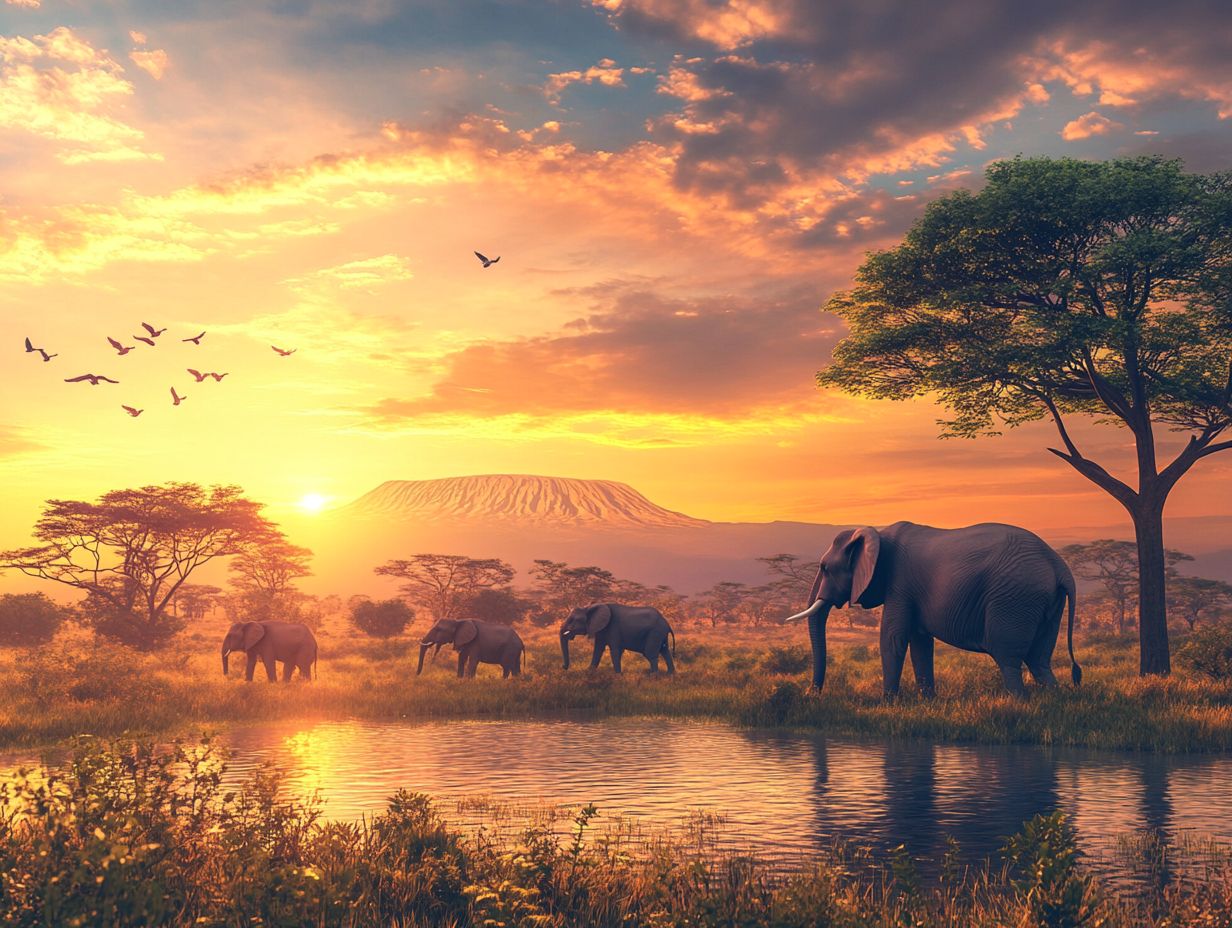
- Explore the diverse wildlife and landscapes sustainably in Africa’s top safari destinations like Maasai Mara, Serengeti, and Okavango Delta.
- Support sustainability efforts by choosing eco-friendly accommodations, responsible tour operators, and engaging in conservation activities during your stay.
- Challenges like poaching and human-wildlife conflict exist, but sustainable safaris help conservation and support local communities.
1. Maasai Mara National Reserve, Kenya
The Maasai Mara National Reserve in Kenya stands as a breathtaking jewel of Africa, celebrated for its stunning vistas and remarkable wildlife. It s an unparalleled destination for those in search of unique experiences in travel that protects nature and adventure travel.
This vast reserve is home to an extraordinary array of wildlife, including majestic elephants, powerful lions, and agile cheetahs. Here, you ll find opportunities for unforgettable safari encounters, like soaring over the landscape in a hot air balloon at sunrise, when the world below is nothing short of magical.
For a more intimate connection with the environment, consider joining guided walking safaris. These adventures not only immerse you in the beauty of the ecosystem but also educate you about the vital wildlife conservation efforts that sustain its delicate balance.
Engaging with the Maasai people helps you understand their rich traditions and customs, fostering an appreciation for the community’s commitment to preserving their land and wildlife for generations to come. These interactions create meaningful experiences that transcend mere sightseeing, nurturing a profound connection to both nature and culture while bolstering the local economy through sustainable tourism practices.
2. Serengeti National Park, Tanzania
Serengeti National Park in Tanzania stands as a premier destination celebrated for its expansive savannahs and rich biodiversity. Here, you have the chance to indulge in unforgettable luxury travel experiences amidst stunning natural landscapes.
This iconic park is not just a feast for the eyes; it plays a vital role in wildlife conservation, acting as a sanctuary for countless species, including the esteemed ‘Big Five’. With luxury accommodations such as opulent safari lodges and exclusive private tours, you can immerse yourself in the beauty of nature while savoring the highest levels of comfort.
The park’s allure reaches its peak during the Great Migration, where millions of wildebeest and zebras journey across the plains in search of lush pastures. This remarkable natural event not only guides wildlife movement but also enhances tourism, attracting adventurers eager to witness the extraordinary dance of life in the wild.
Don’t miss your chance to witness the Great Migration!
3. Okavango Delta, Botswana
The Okavango Delta in Botswana stands as a UNESCO World Heritage site, renowned for its extraordinary ecosystem and thriving wildlife. It is an ideal haven for eco-conscious adventure seekers like you who crave immersive experiences in breathtaking natural settings.
This remarkable wetland is alive with diverse flora and fauna, serving as a crucial habitat for numerous species, including elephants, hippos, and a myriad of birds. It beckons nature enthusiasts from every corner of the globe.
As you explore the Delta, you ll have the opportunity to engage in tourism that supports conservation. Don t miss out on unique activities like mokoro rides, which are traditional canoes, through serene waters and guided walking safaris across varied landscapes. These adventures not only deepen your appreciation for the region’s natural splendor but also support local communities, ensuring that the ecological significance of the Delta endures for generations to come.
4. Kruger National Park, South Africa
Kruger National Park in South Africa is one of Africa’s largest game reserves. It presents extraordinary wildlife viewing opportunities and an array of safari experiences that cater to both luxury seekers and those who prioritize responsible tourism.
Home to a breathtaking variety of species, including the iconic Big Five, the park is essential for conservation efforts that protect its rich biodiversity. You can choose to embark on guided tours led by knowledgeable rangers who offer invaluable insights into the local ecosystem, or you might prefer the thrill of self-drive adventures for a more tailored experience.
The accommodations within the park are well-designed with sustainability in mind, championing eco-friendly practices that benefit the environment and support local communities through job creation and development initiatives. Engaging with this incredible landscape not only deepens your appreciation for wildlife but also contributes to the protection of these precious natural habitats for generations to come.
5. Hwange National Park, Zimbabwe
You can’t miss Hwange National Park in Zimbabwe it’s a paradise for wildlife enthusiasts! With one of the largest elephant populations in Africa, it offers a rich array of fauna that makes for an unforgettable experience in nature and tourism that supports conservation.
But it s not just about the wildlife; the park hosts numerous conservation initiatives dedicated to preserving its unique ecosystems. You can embark on guided safaris, choosing from traditional game drives to immersive walking safaris that invite you to engage intimately with the natural world.
These adventures offer you the chance to spot not only majestic elephants but also endangered species like the African wild dog. By participating in arranged cultural experiences with local communities, you can support ethical travel while gaining firsthand insight into the importance of conservation efforts.
Such interactions will undoubtedly enrich your journey, deepening your connection to both the environment and the remarkable individuals dedicated to its stewardship.
6. Etosha National Park, Namibia
Etosha National Park in Namibia is renowned for its striking salt pans and diverse wildlife. It offers breathtaking views that beckon both adventure seekers and nature enthusiasts eager to immerse themselves in one of Africa’s most iconic safari destinations.
With its vast open plains, rugged mountains, and shimmering waterholes, the park s unique geophysical features create a captivating backdrop for an array of species, including elephants, lions, and rhinos. You ll likely find yourself enchanted by the stunning sunsets reflecting off the salt flats as you embark on guided tours or enjoy the freedom of self-drive adventures across the six distinct ecosystems.
Etosha places a strong emphasis on conservation, prioritizing sustainable tourism practices and encouraging you to engage in responsible wildlife viewing while maintaining a mindful approach to the ecological balance. By fostering a deeper understanding of the region’s ecology, you not only revel in the majestic vistas but also actively support vital conservation efforts aimed at preserving Namibia’s rich biodiversity for future generations.
7. South Luangwa National Park, Zambia
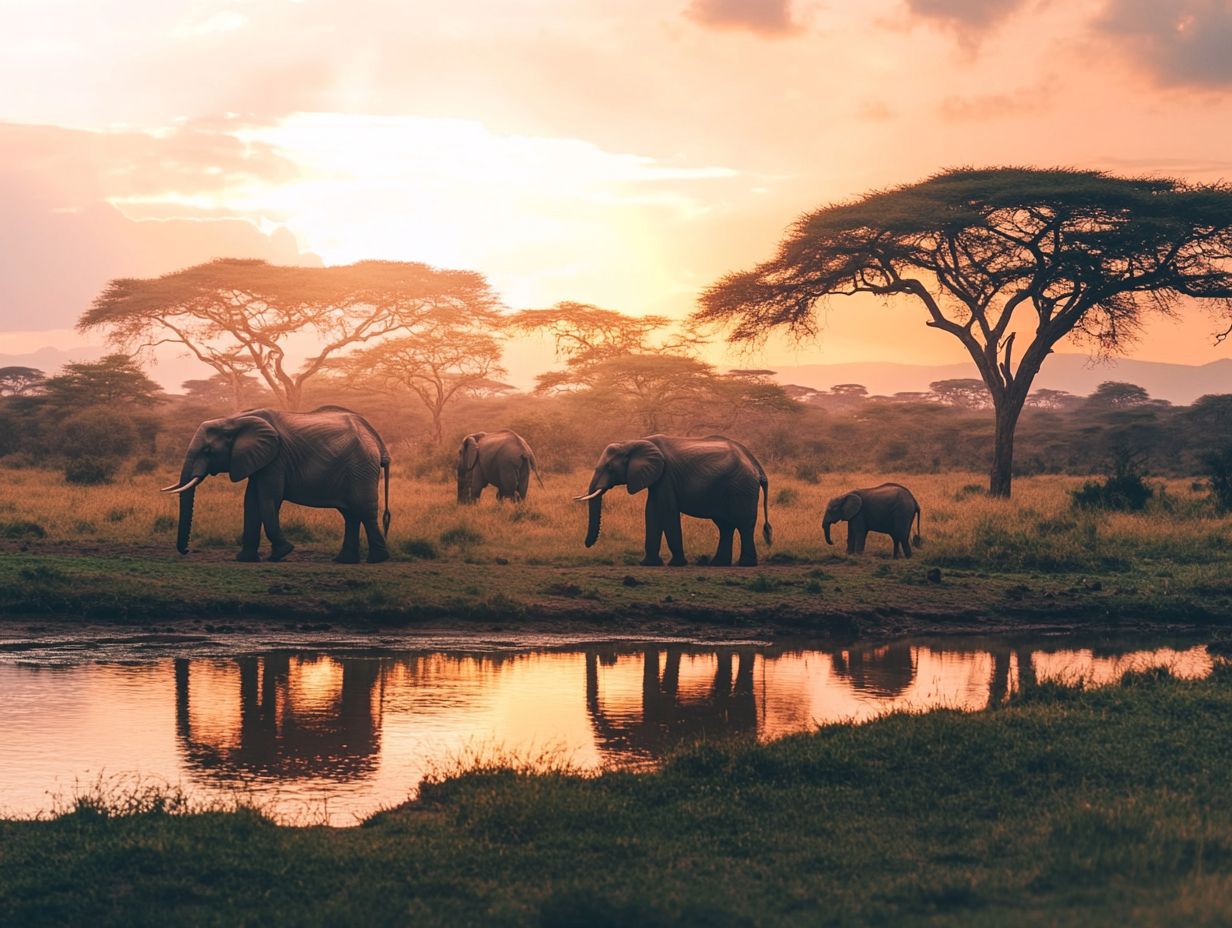
South Luangwa National Park in Zambia stands out as a premier destination for its remarkable wildlife and captivating safari experiences. It’s an ideal choice for those drawn to sustainable tourism and the conservation of Africa’s natural wonders.
Positioned in the heart of the Luangwa Valley, this park is a sanctuary for a diverse array of wildlife. From the majestic elephants that roam freely to the elusive leopards that captivate the imagination, guided walking safaris provide a unique chance to immerse yourself in the environment.
You can observe the intricate relationships between species and their habitats. These experiences help you appreciate biodiversity more while playing a vital role in essential conservation initiatives in the area.
By engaging with local communities, the park fosters sustainable practices that enhance both ecological integrity and economic viability. This ensures that this rich tapestry of life continues to flourish for generations to come.
8. Bwindi Impenetrable National Park, Uganda
Bwindi Impenetrable National Park in Uganda stands as a UNESCO World Heritage site, renowned for its majestic mountain gorillas. Here, you have the opportunity to engage in ethical travel that enhances your journey and contributes to wildlife conservation and community development.
This extraordinary destination is more than just an area rich in wildlife; it serves as a vital area for conservation efforts dedicated to protecting these magnificent creatures and their natural habitat.
By participating in gorilla trekking, an incredible experience where you can observe gorillas in their natural habitat, you deepen your appreciation for the wonders of nature. This ensures that local communities reap economic benefits.
Thanks to sustainable practices like community-led tourism initiatives and wildlife protection programs, a harmonious relationship has blossomed. The surge in tourism revenue has provided essential funding for conservation initiatives, helping to secure a bright future for mountain gorillas in their native environment.
9. Volcanoes National Park, Rwanda
Volcanoes National Park in Rwanda is an absolute gem! It promises breathtaking landscapes and the chance to encounter majestic mountain gorillas. Here, you have a unique opportunity to immerse yourself in wildlife conservation while actively contributing to community development through responsible tourism initiatives.
Nestled among lush volcanic mountains, this UNESCO World Heritage site boasts an impressive array of flora and fauna. The rich biodiversity, featuring endangered species and vibrant ecosystems, underscores the ecological significance of the region.
The cultural heritage of local communities resonates deeply as you engage with traditional practices and stories lovingly passed down through generations. Don t miss the chance to experience this!
When you choose to visit, you’re not just a tourist; you become a vital part of the solution. Your presence supports crucial conservation efforts and enables local livelihoods, fostering a sustainable model where wildlife preservation and community prosperity flourish together.
10. Chobe National Park, Botswana
Chobe National Park in Botswana is your gateway to breathtaking wildlife and eco-friendly safari experiences! It’s perfect for adventure seekers who crave transformative encounters amidst Africa’s stunning natural beauty.
This incredible park serves as a sanctuary for diverse ecosystems. You might catch sight of elephants playfully splashing in the Chobe River or the elusive leopard lounging gracefully in the trees.
Here, sustainable tourism practices take center stage, ensuring that the park’s remarkable biodiversity is preserved while you enjoy unforgettable adventures.
Whether you opt for exhilarating boat safaris that glide silently along the riverbanks or thrilling game drives that plunge deep into the heart of the bush, you’ll find activities designed for every nature enthusiast.
As you immerse yourself in these extraordinary environments, you’ll also play a role in conservation efforts that benefit both wildlife and local communities. Your journey will be all the more meaningful!
11. Masai Mara National Reserve, Kenya
The Masai Mara National Reserve in Kenya is a vital wildlife conservation area, renowned for its rich ecosystems and vibrant cultures. It offers unforgettable adventures as you immerse yourself in Africa’s natural beauty.
Nestled in the heart of the Great Rift Valley, the reserve presents a breathtaking tapestry of landscapes. From open savannahs to dense acacia forests and lush riverine wetlands, each area is teeming with many different animals. Conservation efforts in this region have achieved remarkable success, with numerous initiatives dedicated to protecting endangered species and their habitats, highlighting the importance of sustainable tourism.
You can indulge in exhilarating hot air balloon safaris at dawn, gliding gracefully over the stunning panorama of nature. Engage with the welcoming Maasai communities to enjoy authentic cultural experiences. These interactions deepen your understanding of the local way of life and emphasize the critical role of conservation in ensuring that both wildlife and cultures thrive for future generations.
12. Ngorongoro Conservation Area, Tanzania
The Ngorongoro Conservation Area in Tanzania is a UNESCO World Heritage site, celebrated for its breathtaking volcanic caldera (a large depression formed after a volcano erupts) and remarkable wildlife. Get ready to discover exciting opportunities for cultural enrichment while enjoying unforgettable safari experiences.
As you explore, immerse yourself in the rich traditions of the local Maasai communities, who have thrived in this stunning landscape for generations. Engaging with the Maasai allows you to gain valuable insight into their vibrant customs and practices, which deepens your understanding of their profound connection to the land.
This interaction underscores the vital importance of sustainable tourism, which aims to harmonize environmental preservation with the safeguarding of indigenous cultures. By supporting local artisans and participating in community-led initiatives, you can play a meaningful role in this delicate balance while reveling in the breathtaking beauty and diversity this area has to offer. Help ensure a sustainable future!
13. Amboseli National Park, Kenya
Amboseli National Park in Kenya is an absolute treasure waiting to be explored! It is celebrated for its stunning views of Mount Kilimanjaro and vibrant wildlife, making it the perfect destination for adventure travelers like you seeking an authentic African safari experience.
Nestled among diverse ecosystems, this breathtaking park boasts a rich tapestry of habitats. From wetlands to savannahs, it creates a sanctuary for a magnificent array of animals, including the majestic elephants that roam freely. You can embark on exhilarating guided nature walks to observe wildlife up close while gaining insights into the flora and fauna from knowledgeable guides.
Cultural visits to nearby Maasai communities offer a unique opportunity to immerse yourself in traditional lifestyles and vibrant customs. This enriches your overall journey through this captivating landscape and enhances your awareness of local communities.
14. Queen Elizabeth National Park, Uganda
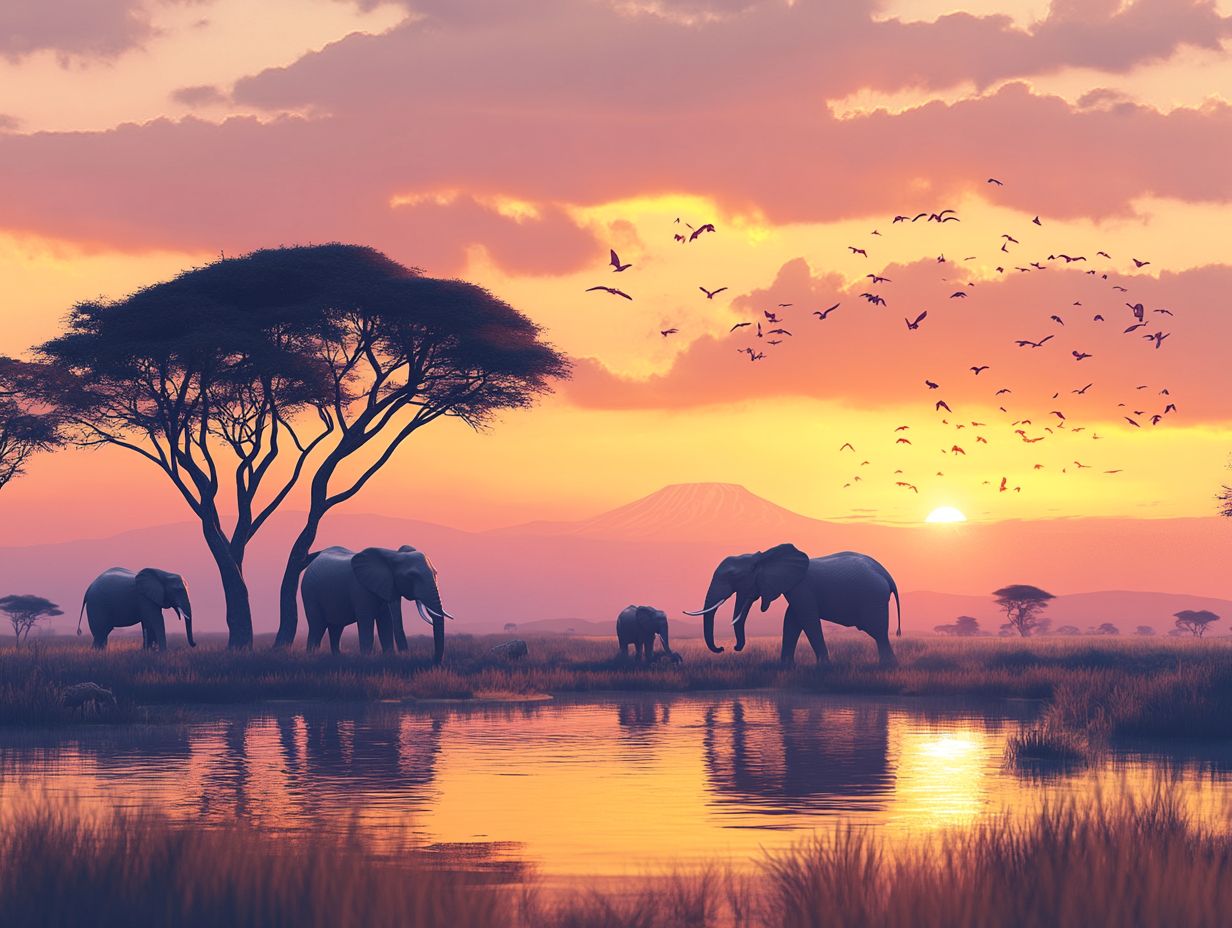
Queen Elizabeth National Park in Uganda presents a captivating ecosystem brimming with wildlife. It offers eco-friendly safari experiences that allow you to delve into its lush landscapes and vibrant animal life.
The park is a sanctuary of rich flora and fauna, making it a paradise for nature lovers. You can embark on exhilarating boat cruises along the Kazinga Channel, where you might catch sight of hippos basking in the sun or elephants quenching their thirst at the water’s edge.
Guided tours led by knowledgeable rangers not only elevate your experience but also provide insight into the park’s crucial conservation efforts aimed at safeguarding endangered species. Sustainable tourism takes center stage here, ensuring that both the exquisite wildlife and the stunning environment are preserved for future generations.
Engaging with local communities allows you to understand how their livelihoods intertwine with these conservation initiatives, fostering a deeper connection to this extraordinary landscape.
15. Kidepo Valley National Park, Uganda
Kidepo Valley National Park in Uganda is a must-visit! This extraordinary off-the-beaten-path destination features breathtaking views and rich wildlife, creating exciting experiences in one of Africa’s most untouched landscapes.
Explore stunning vistas across the vast expanse. Each hike and safari offers a unique adventure. The park serves as a haven for diverse wildlife, from majestic elephants to elusive cheetahs, presenting abundant opportunities for photographers and nature enthusiasts alike.
You can engage in enriching community visits, diving deep into the local culture while supporting eco-friendly habits that benefit the region. For those prioritizing eco-friendly travel, the park offers various accommodations, including eco-lodges, which are environmentally friendly places to stay. These options blend harmoniously with nature, allowing you to rest comfortably while minimizing your ecological footprint.
What Are the Benefits of Choosing a Sustainable Safari?
Choosing a sustainable safari brings many benefits. You ll help wildlife conservation and support local communities, ensuring that your tourism experience positively impacts local ecosystems and economies.
These safaris play a crucial role in safeguarding endangered species and their habitats. For example, many organizations use eco-lodges constructed with local materials and powered by renewable energy, dramatically reducing their carbon footprints.
Successful models in countries like Kenya and Tanzania enable local communities to manage wildlife conservancies. This fosters a genuine sense of ownership and encourages responsible stewardship of natural resources. Such initiatives not only elevate your experience but also create jobs and support local artisans, amplifying the positive impact of sustainable tourism on both the environment and community livelihoods.
How Can Tourists Support Sustainability Efforts in These Destinations?
You can play a pivotal role in supporting sustainability efforts at wildlife destinations by embracing ethical travel practices, contributing to local economies, and selecting eco-friendly accommodations and tours.
By opting for local guides who possess a deep understanding of the area, you not only elevate your travel experience but also ensure that more of your spending benefits the community. Engaging in community projects allows you to deepen your appreciation of local cultures while fostering meaningful positive change.
Supporting conservation initiatives helps preserve the stunning natural beauty and biodiversity that draw you to these destinations. It also cultivates a responsible travel approach that benefits both you and the places you visit.
What Are the Challenges Facing Sustainable Safaris in Africa?
Sustainable safaris in Africa encounter a myriad of challenges, including habitat loss, poaching, and the intricate balance between wildlife conservation and local community development alongside responsible tourism.
These challenges jeopardize the fragile ecosystems that support diverse wildlife and threaten the livelihoods of local communities that depend on tourism for their economic well-being. As habitats shrink due to agricultural expansion and urban development, animals increasingly find themselves in conflict with human populations, creating a detrimental cycle that impacts both species and locals.
To address these pressing issues, stakeholders are forging innovative partnerships that align community needs with conservation efforts. This includes eco-tourism initiatives that enable locals to take an active role in preserving their natural resources, community-led anti-poaching programs, and educational outreach designed to cultivate a deeper understanding of sustainable practices.
How Can Sustainable Safaris Contribute to Conservation Efforts?
Sustainable safaris play a vital role in conservation efforts, generating revenue that directly supports wildlife protection initiatives while promoting community development. This creates a harmonious relationship between tourism and conservation that benefits everyone.
Take Kenya’s Maasai Mara, for example. Revenue from eco-tourism, which focuses on environmental preservation, flows into local conservation programs. This enables the protection of endangered species like the black rhino. Some of these funds support community projects such as schools and healthcare clinics, greatly improving life for locals!
In Namibia, a different yet equally compelling model emerges through tourism that involves local communities. Here, locals financially benefit from wildlife protection, fostering sustainable land-use practices. These examples vividly illustrate how sustainable tourism not only bolsters conservation efforts but also empowers communities, allowing both nature and people to thrive together.
What Are the Best Times to Visit These Sustainable Safari Destinations?
Understanding the optimal times to visit sustainable safari destinations can significantly enhance your wildlife viewing experiences, ensuring you fully immerse yourself in Africa’s breathtaking landscapes.
During the dry season, typically from June to October, many animals migrate toward water sources. This makes sightings more frequent and easier. You can anticipate remarkable opportunities to observe predators in action as they skillfully track their prey.
The wet season, from November to March, brings lush greenery, creating an idyllic setting for birdwatching and witnessing the arrival of newborn animals. However, be prepared for some challenging road conditions.
By crafting itineraries that align with these seasonal patterns, you can maximize your wildlife encounters while deepening your appreciation of diverse ecosystems. Ideal travel times often range from two to three weeks, allowing you to explore both iconic parks and hidden gems. An unforgettable adventure awaits you!
Frequently Asked Questions
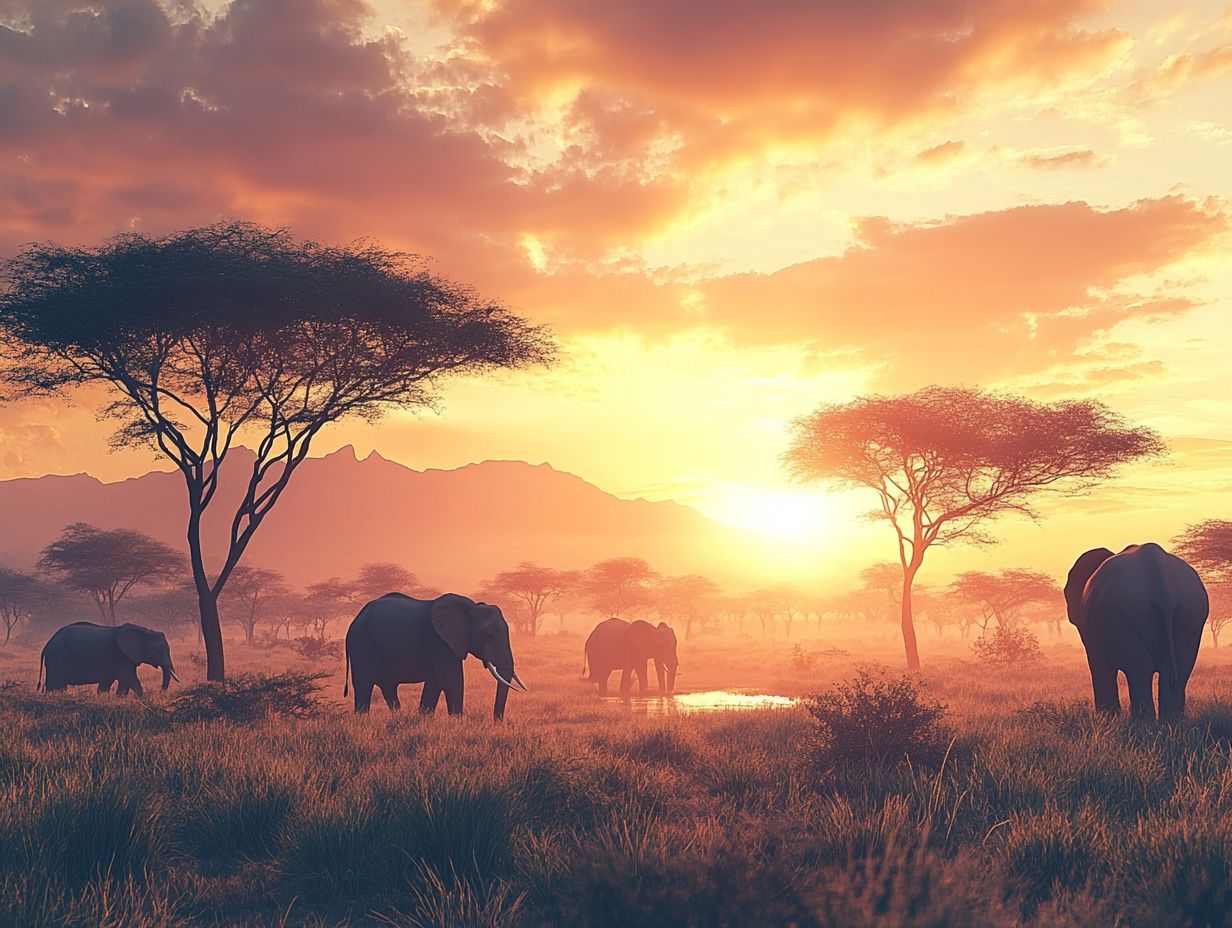
What are Africa’s best sustainable safari spots?
The top sustainable safari destinations in Africa include Namibia, Botswana, Kenya, Tanzania, South Africa, and Zambia.
Why are these destinations considered sustainable?
These destinations have implemented eco-friendly practices such as responsible waste management, conservation of wildlife and natural resources, and support for local communities.
What is the benefit of visiting a sustainable safari destination?
Visiting a sustainable safari destination allows travelers to experience the beauty of Africa while supporting conservation efforts and promoting sustainable tourism.
How can I ensure I am choosing a sustainable safari tour?
Research the tour company and their sustainability practices. Look for certifications and partnerships with conservation organizations. Ask about their responsible tourism initiatives.
What types of activities can I expect to participate in at a sustainable safari destination?
Activities may include game drives, guided walks, and cultural experiences with local communities. Some destinations also offer volunteer opportunities for those interested in hands-on conservation efforts.
Is it possible to have a luxury experience at a sustainable safari destination?
Yes, many sustainable safari lodges and camps offer luxurious accommodations and amenities while maintaining their commitment to sustainability and responsible tourism.

